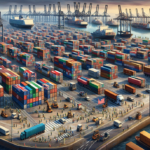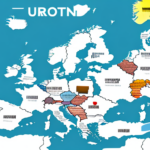Understanding the Impact of Brexit on Global Ecommerce Logistics
Brexit, the withdrawal of the United Kingdom from the European Union, has significantly impacted various industries, including global ecommerce logistics. This article delves into how Brexit has influenced cross-border ecommerce, alterations in customs regulations, the role of technology in mitigating Brexit's effects on ecommerce logistics, and strategies for ecommerce businesses to navigate post-Brexit logistics challenges. Additionally, we explore the implications of tariffs and taxes on global ecommerce post-Brexit, opportunities for local ecommerce businesses, case studies of leading ecommerce companies, the future of global ecommerce logistics in a post-Brexit landscape, and expert opinions on the long-term repercussions of Brexit on global ecommerce logistics.
The Effect of Brexit on Cross-Border Ecommerce
One of the most pronounced impacts of Brexit on global ecommerce logistics is the transformation of cross-border ecommerce dynamics. Prior to Brexit, UK-based ecommerce businesses could seamlessly sell products to EU countries without facing additional customs duties or tariffs. However, post-Brexit, UK ecommerce businesses must adhere to new customs and tariff regulations when trading with EU nations, resulting in increased costs, shipping delays, and reduced operational efficiency. Similarly, EU-based ecommerce businesses encounter analogous challenges when selling to the UK.
Moreover, Brexit has introduced changes to data protection laws affecting cross-border ecommerce. UK businesses are now required to comply with the EU's General Data Protection Regulation (GDPR) when handling personal data of EU customers. This necessitates robust data protection measures to avoid substantial fines. Conversely, EU businesses must align with the UK's data protection standards when managing data of UK customers, adding complexity to cross-border ecommerce operations.
Changes in Customs Regulations and Their Impact on Logistics
The shift in customs regulations due to Brexit has profoundly affected logistics operations. Businesses must now navigate new customs protocols when shipping to and from the UK, which involves additional paperwork, extended processing times, and heightened costs. Increased customs inspections can delay shipping, adversely impacting customer satisfaction and business reputations. In response, many logistics companies have invested in advanced technologies, expanded their networks, and enhanced communication channels with customs authorities to adapt to these changes.
A significant challenge posed by the new customs regulations is the ambiguity and inconsistency in the rules, particularly affecting small and medium-sized enterprises (SMEs) that may lack the resources to manage complex regulatory requirements. To mitigate this, some logistics providers offer consulting services to assist businesses in understanding and complying with the new regulations.
Additionally, Brexit has prompted a shift in trade patterns, with businesses exploring alternative markets and supply chains outside the EU. This trend has increased demand for logistics services in countries like Ireland, the Netherlands, and Germany. Logistics companies with a strong presence in these regions are well-positioned to leverage this shift and expand their operations.
The Role of Technology in Mitigating the Impact of Brexit on Ecommerce Logistics
The rapid evolution of ecommerce logistics demands that businesses swiftly adapt to changes brought about by Brexit. Technology plays a crucial role in mitigating these impacts by streamlining operations. For example, AI-powered logistics platforms can automate the shipping process, ensuring compliance with new customs regulations while minimizing costs. Technologies such as GPS trackers, real-time tracking systems, and driver management tools enhance supply chain optimization and operational efficiency.
Furthermore, businesses are exploring blockchain technology to bolster the security and transparency of their supply chains. Blockchain facilitates the creation of tamper-proof records of transactions from origin to destination, reducing fraud risks and enhancing the traceability of goods. This is particularly valuable in the Brexit context, where new customs regulations may require additional documentation and verification.
How Ecommerce Businesses Can Adapt to Post-Brexit Logistics Challenges
Ecommerce businesses can adopt several strategies to navigate post-Brexit logistics challenges:
- Diversify Supply Chains: Reducing reliance on a single market by sourcing from multiple regions.
- Renegotiate Contracts: Adjusting agreements with logistics providers to better align with new regulations.
- Partner with Local Fulfillment Centers: Enhancing delivery speed and reducing shipping costs.
- Invest in Technology: Leveraging advanced tools to automate and optimize logistics processes.
- Optimize Shipping Processes: Streamlining operations to enhance efficiency and reduce delays.
Additionally, staying informed about ongoing developments in customs regulations and tariffs is essential. Proactive adaptation to regulatory changes can help minimize Brexit's impact on business operations.
Improving customer experience is another vital strategy. Providing clear and transparent information about shipping times, costs, and customs duties can build customer trust. Offering flexible delivery options, such as click-and-collect or local pickups, can mitigate the effects of potential shipping delays, fostering customer loyalty even amidst Brexit-related challenges.
The Impact of Tariffs and Taxes on Global Ecommerce Post-Brexit
The introduction of tariffs and taxes on goods traded between the UK and the EU post-Brexit has significantly affected global ecommerce. These additional costs are often transferred to consumers, resulting in higher prices for end customers. New regulations regarding Value-Added Tax (VAT) have also been implemented, complicating compliance for cross-border ecommerce businesses.
One major challenge for ecommerce businesses post-Brexit is navigating the intricate customs procedures and regulations, which can lead to delivery delays and increased administrative burdens. These challenges are particularly burdensome for smaller businesses with limited resources to manage additional compliance requirements.
Furthermore, Brexit-induced uncertainties around data protection regulations have impacted cross-border data flows. Ecommerce businesses reliant on the transfer of personal data between the UK and the EU may face additional costs and administrative tasks to comply with evolving data protection standards.
Opportunities for Local Ecommerce Businesses in the Wake of Brexit
Despite the hurdles posed by Brexit, local ecommerce businesses can seize new opportunities. The complexity of cross-border ecommerce post-Brexit opens avenues for local businesses to capture a larger share of the domestic market by offering competitive prices and faster delivery times. Businesses that swiftly adapt to the new customs regulations and taxes can gain a competitive edge over less adaptable competitors.
Additionally, the growing consumer preference for supporting local and small businesses presents further opportunities. By emphasizing their local presence and community engagement, these businesses can forge stronger customer relationships and differentiate themselves from larger, international competitors. This approach can lead to increased customer loyalty and organic growth through word-of-mouth referrals, which are invaluable for expanding the customer base.
Case Studies: How Leading Ecommerce Companies are Responding to Brexit-Related Logistics Challenges
Several leading ecommerce companies have proactively adapted to Brexit-induced logistics challenges. For instance, companies like Amazon and eBay have expanded their logistics networks, invested in advanced technologies, and partnered with local fulfillment centers to mitigate Brexit's impact on their operations. Additionally, companies such as ASOS have diversified their supply chains by sourcing products from alternative regions, reducing dependency on EU suppliers.
Another strategic response involves adjusting pricing strategies. Some companies have increased prices to offset the additional costs associated with customs clearance and tariffs, while others have chosen to absorb these costs to remain competitive. However, absorbing costs may not be sustainable long-term, prompting companies to explore alternative solutions for cost management.
Moreover, ecommerce companies are expanding into new markets outside the EU to broaden their customer base and reduce reliance on the EU market. Companies like Zalando and Farfetch are extending their presence in Asia and the Middle East, tapping into the growing demand for luxury goods in these regions. This diversification not only stabilizes revenue streams but also diminishes exposure to Brexit-related risks.
The Future of Global Ecommerce Logistics in a Post-Brexit World
As the repercussions of Brexit continue to unfold, the future of global ecommerce logistics remains complex and evolving. Logistics providers must persist in adapting to new customs regulations and taxes, while ecommerce businesses need to refine their strategies to mitigate Brexit's effects. Technology will remain pivotal in addressing these challenges, enabling businesses to enhance efficiency and compliance.
A key challenge for ecommerce businesses in a post-Brexit environment is the potential rise in delivery times and costs. Enhanced customs regulations and taxes may lead to longer shipment processing times and increased expenses for both businesses and consumers. To counteract these issues, ecommerce businesses might consider alternative delivery options, such as local fulfillment centers or partnerships with regional logistics providers, ensuring timely and cost-effective deliveries.
Expert Opinions: Perspectives on the Long-Term Impact of Brexit on Global Ecommerce Logistics
Experts offer varied perspectives on Brexit's long-term impact on global ecommerce logistics. Some anticipate short-term disruptions due to regulatory adjustments, while others believe that the introduction of increased regulations and taxes will ultimately foster a more stable and sustainable logistics environment. The true extent of Brexit's impact on global ecommerce logistics will unfold over time, contingent on how businesses and logistics providers adapt to the evolving landscape.
In conclusion, Brexit has profoundly influenced global ecommerce logistics, affecting cross-border trade, altering customs regulations, and amplifying the role of technology. To minimize these impacts, ecommerce businesses must adapt their strategies, stay abreast of regulatory changes, and invest in technology and strategic partnerships. With a proactive approach, businesses can navigate the post-Brexit logistics landscape and thrive in the long run.
Looking ahead, one potential long-term impact of Brexit on global ecommerce logistics is the reconfiguration of trade relationships. With the UK no longer part of the EU, businesses may need to establish new trade agreements and partnerships to sustain their cross-border ecommerce operations. This shift could introduce increased competition and create a more intricate logistics landscape. However, it also presents opportunities for businesses to expand into new markets and diversify their supply chains, fostering resilience and growth in a post-Brexit era.




















